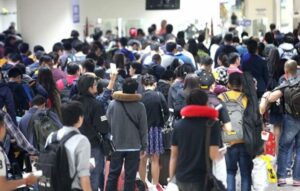The argument over whether deployment prohibitions work to protect OFWs is again in the spotlight following Jullebee Ranara’s recent death in Kuwait.
MANILA, Philippines – Calls for a deployment restriction to Kuwait have grown following the murder of Jullebee Ranara, 35, by her employer’s 17-year-old son.
A recurrent issue has been the imposition of a deployment ban, with some believing that it is a necessary precaution to safeguard overseas Filipino workers (OFWs). Others claim that the decision is a general one that harms Filipino households that depend on remittances from overseas workers.
In 2020, there were about 5,000 incidences of maltreatment of OFWs reported, with 4,302 of those cases coming from the Middle East. Department of Migrant Workers (DMW) Undersecretary Bernard Olalia acknowledged that OFWs in difficult situations do not receive enough support during a hearing in December last year.
The truth is that many of our OFWs would prefer to return home after facing contractual violations, physical abuse, sexual abuse, and other forms of harassment than seek redress from these negligent and uncooperative employers and principals, he said. The fact of the matter is that we lack the funding to help them. Many Filipinos are forced to abandon their families and expose themselves to maltreatment due to pressure factors including a lack of employment prospects and low pay in the Philippines.
If there were enough jobs and competitive pay here in the Philippines, “I have yet to hear of a Filipino worker who would much rather work abroad and be away from his family,” said Adamson Law School Dean Atty. Abad Ada.
The money that migrants send home helps a nation’s balance of payments, especially for nations like the Philippines that export labor.
According to the Bangko Sentral ng Pilipinas (BSP), overseas Filipinos’ remittances hit a record high of $36.14 billion in 2022, making up 8.9% of the country’s GDP. This was a result of economies recovering from the pandemic and increased demand for international labor.
One of the largest migrations in the world is made up of Filipinos living abroad, with many employed as contract workers in the Middle East. In 2021, 1.83 million OFWs were employed, with about 24.4% of them working in Saudi Arabia, 14.4% in the UAE, 5.9% in Kuwait, and 4.8% in Qatar.
OFWs in Qatar
In 2017, the Philippines issued a deployment embargo in Qatar, which was later partially withdrawn amid a split between Qatar and nearby Arab nations over Doha’s suspected support for terrorism.
The Qatari government signed an agreement with the International Labour Organization (ILO) in 2017 with a promise of reform after coming under pressure from the international community to address the exploitation of migrant workers.
By eliminating the No Objectification Certificate (NOC) requirement in 2020, Qatar achieved progress. Even if all employees are now permitted to change jobs before the end of their contracts without receiving an employer’s no-objection certificate, many would still be vulnerable to manipulation due to lax implementation and enforcement.
There were allegations of abuse of OFWs before the 2022 World Cup in Qatar.
OFWs in Saudi Arabia
Research by the Philippine Statistics Authority found that Saudi Arabia was the most popular destination for OFWs in 2020.
The alleged maltreatment of Filipino laborers by a retired general and allegations of unpaid salaries to construction workers totaling billions of pesos caused the suspension of new deployments in 2021.
Through bilateral discussions, the embargo was lifted in November 2022. Labor reforms and increased protection for OFWs were agreed upon by both nations. A typical employment contract that gives OFWs the option to pre-terminate contracts was incorporated into the arrangements.
OFWs Kuwait
After the death of Filipina domestic worker Joanna Demafelis, whose body was discovered in a freezer in her employer’s abandoned apartment, a deployment restriction to Kuwait was put in place in 2018.
Later that year, the two nations agreed to a labor agreement that contained clauses to guarantee the security of all Filipino skilled and domestic workers in Kuwait, and the ban was withdrawn as a result. Over 268,000 OFWs currently reside in Kuwait, with 73% of them being female and 88% working as domestic help.
The protection of OFWs in Kuwait continued to be an issue even after the deployment prohibition was lifted in 2020. There is now much more pressure on the government to act following the tragic murder of Ranara, whose case is still under investigation.
Government Initiatives
Concerns about the welfare and protection of OFWs will be addressed, according to the Philippine government, especially for those who work in nations where their rights and safety are not always guaranteed.
Susan Ople, secretary of the DMW, claimed to have observed firsthand the unsanitary living conditions in Kuwaiti government-run shelters.
She is confident that Kuwait’s current bilateral labor deal may be strengthened. It seems improbable that the Philippines would put a complete prohibition on deployment. There are actual OFWs who have worked in Kuwait for several years who still want to return to or look for new employers, according to Ople.
She reassured expatriates that many other nations are eager to hire them and that there is a market for them there. In addition to Singapore, where we have excellent ties with our counterpart ministry, Hong Kong is still a viable possibility and is considerably closer to home, according to Ople.





